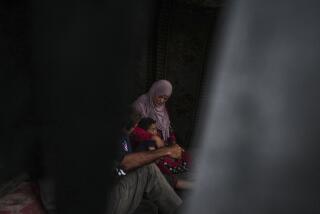Darfur joins the Seder table
- Share via
As Jewish families throughout the region gather this week to celebrate Passover, the holiday celebrating freedom from slavery, a passionate group of organizers at Jewish World Watch hope that 5-by-7-inch cards will lie beside the flat bread and bitter herbs at the traditional meal, or Seder.
The cards ask probing questions about helping refugees in Sudan’s Darfur region. Since 2003, more than 200,000 have died in Darfur; more than 2 million live in disease-ridden refugee campus.
“Passover lends itself so well to conversation and action to those who are enslaved,” said Janice Kamenir Reznik, founding president of Jewish World Watch, the Encino-based freedom advocacy group that has stuffed and mailed 6,000 card packets.
“The very core of the holiday is the critical importance that people are free.”
One running theme in the eight-day holiday, which began Monday night, is the encouragement of young Jews to ask questions about their ancestors’ slavery and discuss what oppression means today. Reznik said this part of the holiday “raises Jewish moral sensibility.”
Passover recounts the Israelites’ enslavement and eventual exodus from Egypt, using the meal as a guide. Flat bread is eaten because when the Israelites fled Pharaoh’s rule, there was no time to wait for the bread to rise. Bitter herbs are a reminder of the bitterness of slavery.
“It’s a very dramatic moment,” said Rabbi Harold Schulweis of Valley Beth Shalom in Encino, who was at the Jewish World Watch office Monday. “You experience above all else that God wants freedom.”
Tradition calls for four questions to be asked during the Passover meal to stimulate discussion. The Darfur-advocacy cards, which were published recently in the Jewish Journal, mirror this approach by posing four simple questions to get people talking about the atrocities in Darfur.
One of the cards asks: “Why is Darfur our problem?”
Underneath, a short story is told about a young pregnant Sudanese woman beaten and raped by seven men of the Arab militias, called the janjaweed. The Arab-dominated government is accused of releasing the janjaweed after rebels rose up against the Sudanese government in 2003.
“We have tried to connect what is happening in Darfur with Exodus
The organization’s three-member staff mailed the green-and-black cards, bearing photographs of refugees, to 55 affiliated synagogues and others who expressed an interest in their cause.
One person who received a card, Bonnie Somers of Calabasas, called Jewish World Watch to say she incorporated the Darfur cards in her early Passover meal Sunday night. She said the questions -- which include “Who are they to us, those people in Darfur?” -- transformed her Passover meal, adding a “21st century dimension.”
More to Read
Sign up for Essential California
The most important California stories and recommendations in your inbox every morning.
You may occasionally receive promotional content from the Los Angeles Times.













